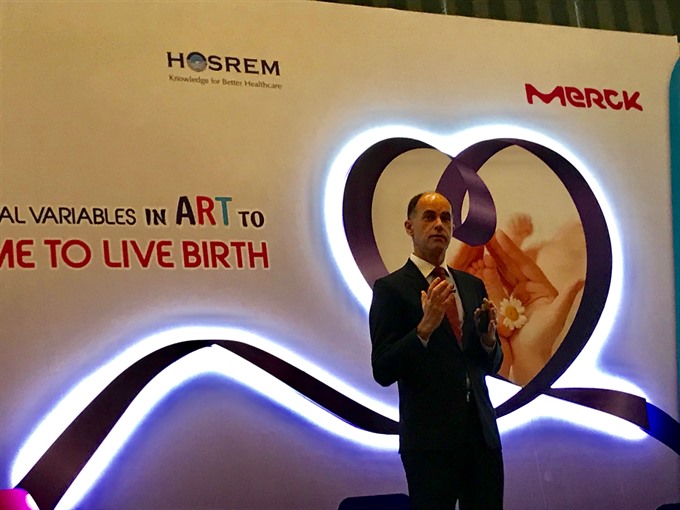 Society
Society

Foreign and Vietnamese fertility experts last Saturday (August 25) discussed infertility treatments using assisted reproductive technology at a two-day international conference held in HCM City.
 |
| Dr Sandro C. Esteves of the University of Campinas in Brazil discusses personalised strategies for Assisted Reproductive Technology (ART). — VNS Photo Gia Lộc |
HCM CITY — Foreign and Vietnamese fertility experts on Saturday discussed infertility treatments using the latest assisted reproductive technology at a two-day international conference held in HCM City.
Speaking at the “Learning Initiative for Fertility Experts” conference, Dr Sandro C. Esteves of the University of Campinas in Brazil, said that doctors at fertility centres should develop a time-limited treatment plan and choose techniques which deliver the best outcome while paying attention to the safety of the patient.
He said that patients who discontinue fertility treatments often do so because of poor quality of service, the physical burden, and a lack of psychological support.
Forty-five per cent to 60 per cent of patients discontinue treatment after the first completion of the In Vitro Fertilization (IVF) cycle, he added.
Hong Ye, of the Institute of Genetics and Reproduction in China, said that poor ovarian response is associated with disappointingly low pregnancy rates and is one of the most challenging patient groups to manage
She described the best ways to recognise reliable predictors or biomarkers of ovarian response, which can help doctors individualize treatment strategies.
Dr Vương Thị Ngọc Lan, of the HCM City Medicine and Pharmacy University’s department of obstetrics and gynaecology, told Việt Nam News that Vietnamese fertility experts have updated their techniques and professional skills to help patients get pregnant in the first IVF cycle.
At the centre where she works, the rate of pregnancy success is 60 per cent, with most patients becoming pregnant after two cycles.
“Young people who have fertility problems should visit doctors for treatment as soon as possible because many studies show that the number and quality of eggs decline as they age,” Lan said.
According to the World Health Organisation, infertility and subfertility affect a significant proportion of the world’s population.
The organisation’s latest forecast showed that infertility and sterility will be the third-most serious health problem worldwide in the 21st century, after cancer and cardiovascular disease.
In the Asia Pacific region, Việt Nam is among the countries with the lowest fertility rates and highest infertility rates.
A study of more than 14,300 couples aged 15 to 49 in eight provinces and cities by the National Hospital of Obstetrics and Gynecology and Hà Nội University of Pharmacy in 2015 showed that the infertility rate in the country stood at 7.7 per cent, while the world rate was 6-12 per cent.
The conference was held by the HCM City Society for Reproductive Medicine in co-operation with Merck which is a science and technology company in healthcare, life science and performance materials. —VNS




